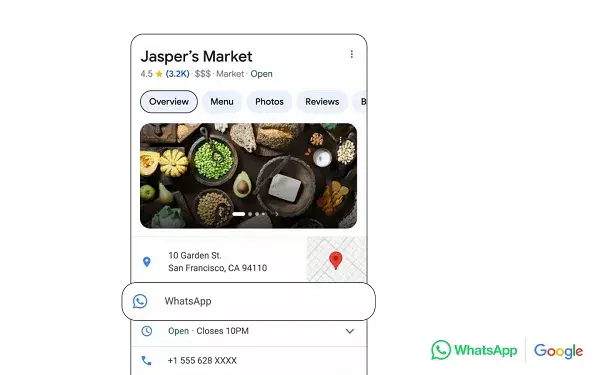Meta’s recent announcements at the Conversations 2025 conference unveil a strategic shift that signals a new era for business communication. The company recognizes the critical importance of messaging platforms in today’s digital landscape, where customer engagement is increasingly driven by real-time, personalized interactions. By introducing an array of innovative features, Meta aims to empower brands to create seamless, meaningful connections with their audiences. These developments go beyond superficial updates—they represent a fundamental reimagining of how businesses can leverage messaging to foster loyalty, streamline operations, and ultimately boost revenue.
One of the most significant enhancements is the integration of WhatsApp directly into Google Business Profiles. This seemingly simple feature—that allows users to contact businesses through WhatsApp from Google Search and Maps—has profound implications. It reduces friction for prospective customers, making it easier than ever to initiate conversations without switching platforms. This move underscores Meta’s understanding that discovery and engagement often happen in different digital ecosystems; by bridging these gaps, Meta positions itself as an essential intermediary in the customer journey.
Furthermore, Meta’s focus on empowering users by giving them more control over their interactions is noteworthy. Allowing WhatsApp users to open business links directly within WhatsApp eliminates unnecessary app-switching, creating a frictionless experience that encourages more frequent and spontaneous communication. This streamlined approach not only enhances user convenience but also generates richer data for businesses, enabling them to refine their messaging strategies and increase response rates.
Redefining Business Messaging Economics and Strategy
Meta’s updates are equally attentive to the needs of businesses seeking scalable, effective advertising solutions. Recognizing that messaging should be more outcome-oriented, the company is introducing new features that optimize campaigns for conversions like purchases and leads. For instance, the integration of purchase and lead models into click-to-message ads marks a strategic shift toward maximizing return on ad spend. These tools incentivize brands to craft targeted, high-intent interactions, turning messaging into a conversion engine rather than just a communication channel.
The introduction of “value optimization” for Messenger ads exemplifies Meta’s commitment to ROI-focused advertising. By dynamically adjusting ad delivery based on the likelihood of desired outcomes, Meta allows businesses to get more bang for their buck. Moreover, the ability to deliver ads that open in preferred messaging apps—whether WhatsApp, Messenger, or Instagram Direct—provides versatility, ensuring businesses can meet customers wherever they are most comfortable.
Another impactful aspect is Meta’s revision of pricing models through new volume tiers. This adaptive approach caters to businesses of all sizes, acknowledging that a one-size-fits-all pricing system stifles growth and innovation. With flexible, tiered options, smaller businesses can now access advanced messaging features, democratizing access and fueling broader adoption.
Enhanced Tools for Operational Efficiency and Personalization
Meta is not merely enhancing messaging for marketing; it’s also equipping businesses with tools that improve operational efficiency. The expansion of WhatsApp Business Platform features, enabling simultaneous use of platform and app functionalities, demonstrates a focus on productivity. Additionally, native order tracking via WhatsApp—integrated through popular shopping platforms like Shopify and WooCommerce—blurs the line between commerce and communication. Customers can now receive order updates and tracking info seamlessly within messaging apps, fostering transparency and trust.
Meanwhile, the rollout of capabilities such as sending one-time verification codes builds on the trustworthiness of WhatsApp as a secure, reliable channel. This not only simplifies authentication but also enhances user confidence, which is crucial in an era increasingly concerned with privacy and security.
On the messaging front, Messenger’s upcoming features like caller identification and AI-driven call summaries underline Meta’s holistic approach to communication. These enhancements aim to reduce friction, improve clarity, and create a richer, more interactive experience for users and brands alike.
Strategic Implications for Business Messaging
Meta’s aggressive innovation pipeline reveals a clear motive: to cement messaging as the backbone of digital commerce and customer engagement. While these updates appear incremental on the surface, their strategic implications are profound. They push businesses to consider messaging not merely as a support tool but as a core component of marketing, sales, and customer service strategies.
However, this wave of features also demands critical scrutiny. Is Meta risking user privacy with such deep integration? Does the emphasis on outcome-driven advertising risk devolving into manipulative tactics? These are questions businesses must grapple with as they adopt new tools. Yet, the overarching reality remains—if used judiciously, Meta’s messaging ecosystem could redefine how brands build meaningful, lasting relationships with consumers in the digital age.
In essence, Meta’s vision is ambitious: create an interconnected messaging universe where every interaction is optimized for business growth and customer satisfaction. As competition intensifies and consumer expectations evolve, those who embrace these innovations thoughtfully will likely emerge as the leaders in tomorrow’s digital economy.

